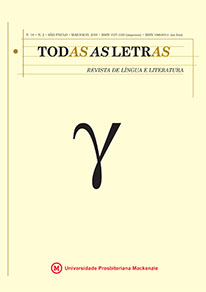PhoneticPercePtionsaboutPost-vocalic (-r) in são Paulo
principais correlações
Abstract
In sociolinguistic interviews, paulistanos (people born and raised in the city of São Paulo) comment on two “degrees of retroflexion” of post-vocalic (-r): a “strong” and a “weak” pronunciation, which respectively correspond to the retro-flex and the alveolar approximant. The former is generally believed to be em-ployed by people who live in the state’s countryside, while the latter is conside-red to be present in Paulistano speech. These two variants are in opposition to the tap, the prototypical Paulistano variant. This paper discusses results of a sociophonetic experiment that measures how differently these acoustic subtle-ties are perceived by different groups of Paulistanos. The main goal is to verify if the speakers’ social categories have an influence on whether the variants are perceived as more different or more similar.
Downloads
References
BAAYEN, R. Analysing linguistic data:a practical introduction to statistics. Cambridge: Cambridge University Press, 2008.
BYBEE, J. Phonology and language use. Cambridge: Cambridge University Press, 2001.
CAMPBELL-KIBLER, K. Listener perceptions of sociolinguistic variables: the case of (ing). 2006. 282 f. Tese (Doutorado em Linguística)–Stanford University, Stanford, 2006.
CAMPBELL-KIBLER, K. Accent, (ING), and the social logic of listener percep-tions. American Speech, Durham, v. 82, n. 1, p. 32-61, Spring 2007.
CAMPBELL-KIBLER, K. The nature of sociolinguistic perception. Language Var-iation and Change, Cambridge, n. 21, p. 135-156, 2009.
CASTILHO, A.; PRETI, D. (Ed.). A linguagem falada culta na cidade de São Pau-lo: materiais para seu estudo. São Paulo: T. A. Queiroz, 1986. v. I – Elocuções formais.DRAGER, K. Sociophonetic variation in speech perception. Language and Lin-guistics Compass, v. 4, n. 7, p. 473-480, July 2010.
DRAGER, K. Experimental methods in sociolinguistics: matched guise and identification tasks. In: HOLMES, J.; KIRK, H. (Ed.). Research methods in soci-olinguistics: a practical guide. Hoboken: Wiley-Blackwell, 2013.
FOULKES, P.; SCOBBIE, J.; WATT, D. Sociophonetics. In: HARDCASTLE, W.; LAVER, J.; GIBBON, f. (Ed.). Handbook of phonetic sciences. Oxford: Blackwell, 2010. p. 703-754.
HAY, J.; DRAGER, K. Sociophonetics. Annual Review Anthropology, v. 36, p. 89-103, Oct. 2007.
IRVINE, J. Style as distinctiveness: the culture and ideology of linguistic differ-entiation. In:ECKERT, P.; RICKfORD, J. (Ed.). Style and sociolinguistic varia-tion. Cambridge: Cambridge University Press, 2001. p. 21-43.
LABOV, W. Sociolinguistic patterns. Philadelphia: University of Pennsylvania Press, 1972.
LADEfOGED, P.; BROADBENT, D. E. Information conveyed by vowels. The journal of the Acoustical Society of America, v. 29, n. 1, p. 98-104, Jan. 1957.
MENDES, R. B. Sounding paulistano: variation and correlation in São Paulo. Trabalho apresentado no NWAV39, San Antonio, Texas, 2010.
MENDES, R. B. Gendered perceptions of noun agreement in Brazilian Portu-guese. Revista Internacional de Linguística Iberoamericana (RILI), Madrid, v. 23, n. 1, p. 93-108, 2014.
MENDES, R. B.; OUSHIRO, L. R. Percepções sociolinguísticas sobre as varian-tes tepe e retroflexa na cidade de São Paulo. In: HORA, D.; NEGRãO, E. V. (Ed.). Estudos da Linguagem. Casamento entre temas e perspectivas. João Pessoa: Ideia, 2011. p. 229-245.
MENDES, R. B.; OUSHIRO, L. O paulistano no mapa sociolinguístico brasileiro. Alfa, Araraquara, v. 56, n. 3, p. 973-1001, 2012.
NIEDZIELSKI, N. The effect of social information on the perception of sociolin-guistic variables. Journal of Language and Social Psychology, v. 18, n. 1, p. 62-85, Mar. 1999.
OUSHIRO, L. Identidade na pluralidade. Avaliação, produção e percepção lin-guística na cidade de São Paulo. 2015. 394 f.Tese (Doutorado em Semiótica e Linguística Geral)–Universidade de São Paulo, São Paulo, 2015.
OUSHIRO, L.; MENDES, R. B. A pronúncia do (-r) em coda silábica no portu-guês paulistano. Revista do GEL, São Paulo, v. 8, n. 2, p. 66-95, 2013 [2011].
R CORE TEAM. R: a language and environment for statistical computing. R foundation for Statistical Computing, Vienna, Austria, 2013. Disponível em: <http://www.R-project.org/>. Acesso em: 16 jul. 2016.
SORIANO, L. G. M. Percepções sociolinguísticas: o /-r/ em São Paulo, 2014. Trabalho apresentado no 3°CIDS, Londrina.
Downloads
Published
How to Cite
Issue
Section
License
Copyright (c) 2016 Todas as Letras - Revista de Língua e Literatura

This work is licensed under a Creative Commons Attribution-NonCommercial 4.0 International License.
The originals accepted and published become property of Mackenzie Presbyterian University, being forbidden their total or partial reproduction without permission of the Editorial Board, except for study and research.




